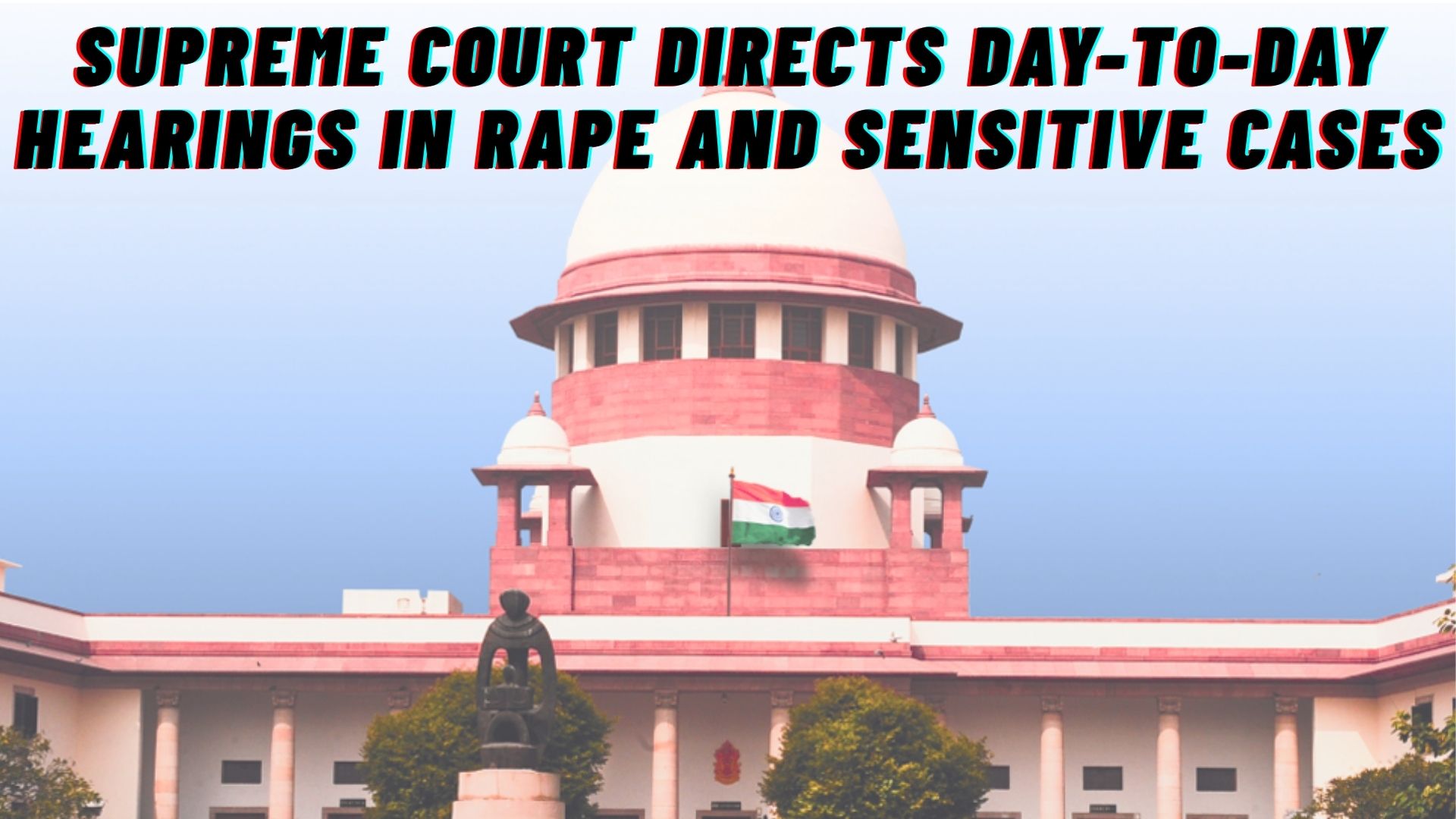 Apex Court Stresses Speedy Justice for Victims of Sexual Violence
Apex Court Stresses Speedy Justice for Victims of Sexual Violence
Judges Highlight Need for Accountability and Strict Monitoring of Trials
By Our Legal Reporter
New Delhi: September 29, 2025: The Supreme Court of India has issued a strong directive to all trial courts across the country, asking them to conduct day-to-day hearings in rape and other sensitive cases. The Court emphasized that delays in such trials not only deny justice to victims but also weaken public confidence in the judicial system.
The ruling comes amid growing concern over the slow pace of trials in sexual offence cases, despite earlier directions and special laws aimed at ensuring speedy justice.
Background of the Case
The matter came before the Supreme Court while hearing a petition that highlighted the long delays in rape trials across several states. Despite the Criminal Law (Amendment) Act, 2013 and the Protection of Children from Sexual Offences (POCSO) Act, which mandate speedy trials, many cases continue to drag on for years.
The Court noted that such delays cause immense trauma to survivors, discourage witnesses from testifying, and often result in accused persons misusing bail provisions.
Supreme Court’s Observations
The bench made several important observations during the hearing:
- Day-to-Day Hearings: The Court directed that rape and sexual offence cases must be heard on a day-to-day basis until they are concluded.
- No Unnecessary Adjournments: Trial courts were told not to grant adjournments unless necessary.
- Accountability of Judges: The Court said that presiding officers must be held accountable if they fail to prioritize such cases.
- Monitoring Mechanism: The Court suggested that High Courts should regularly monitor the progress of rape trials in their jurisdictions.
Why This Matters
The Supreme Court’s ruling is significant for several reasons:
- Justice for Victims: Survivors of sexual violence often face stigma, trauma, and social pressure. Speedy trials can help them rebuild their lives.
- Deterrence: Quick trials and strict punishment can act as a deterrent against sexual crimes.
- Public Confidence: The ruling reinforces faith in the judiciary by showing that the courts are committed to protecting vulnerable victims.
- Legal Mandates: The decision strengthens earlier provisions in law that already require speedy disposal of such cases.
Existing Legal Framework
India has several laws and guidelines that mandate speedy trials in rape and sexual offence cases:
- Criminal Law (Amendment) Act, 2013: Introduced after the Nirbhaya case, it requires that rape trials be completed within two months.
- POCSO Act, 2012: Mandates speedy trials in cases involving child victims.
- Supreme Court Guidelines: In earlier judgments, the Court has directed that such cases be given top priority.
Despite these provisions, implementation has been weak, with many cases pending for years.
Challenges in Implementation
The Supreme Court acknowledged that several challenges contribute to delays:
- Shortage of Judges: Many trial courts are overburdened with cases.
- Lack of Infrastructure: Special courts for POCSO and rape cases often lack proper facilities.
- Witness Hostility: Delays increase the risk of witnesses turning hostile.
- Adjournments: Frequent adjournments by lawyers slow down the process.
The Court stressed that these challenges cannot be excuses for denying justice.
Reactions from Experts
Legal experts and activists have welcomed the Supreme Court’s directive.
- Women’s Rights Groups: Activists said the ruling will help reduce the trauma faced by survivors who are forced to wait years for justice.
- Lawyers: Senior advocates noted that the directive will push trial courts to prioritize sensitive cases.
- Police Officials: Some officers said that faster trials will also encourage better investigation and evidence collection.
Broader Implications
The ruling has wider implications for India’s justice system:
- Judicial Reforms: It may push for reforms in case management and allocation of judicial resources.
- Training for Judges: Judicial academies may introduce refresher courses on handling sensitive cases.
- Victim Support: Faster trials may encourage states to strengthen victim support services, including counselling and rehabilitation.
- Public Awareness: The ruling may increase awareness about the importance of reporting sexual offences.
International Comparisons
Other countries have also adopted measures to ensure speedy trials in sexual offence cases:
- United States: Many states have “fast-track” provisions for sexual assault cases.
- United Kingdom: Special courts and victim support units ensure quicker hearings.
- Canada: Courts prioritize sexual offence cases to reduce trauma for victims.
India’s directive aligns with these global practices, though effective implementation remains the key challenge.
Conclusion
The Supreme Court’s directive for day-to-day hearings in rape and sensitive cases is a landmark step toward ensuring speedy justice for survivors of sexual violence. By holding trial courts accountable and discouraging unnecessary adjournments, the Court has reinforced the principle that justice delayed is justice denied.
If implemented effectively, the ruling could transform the way India handles sexual offence cases, ensuring that survivors receive timely justice and that offenders are punished without delay.
ALSO READ POPULAR ARTICLES
-
SC Upholds FIR Quashing for DM Gaming in Karnataka Poker Case
-
Delhi HC Seeks Uniform Civil Code, Flags Child Marriage Law Clash
-
SC Orders Builder to Refund ₹43 Lakh + 18% Interest for Delay
-
Delhi HC Warns Against Misuse of Section 498A in Matrimonial Cases
-
Karnataka HC Rejects X Corp’s Plea Against Govt Takedown Orders